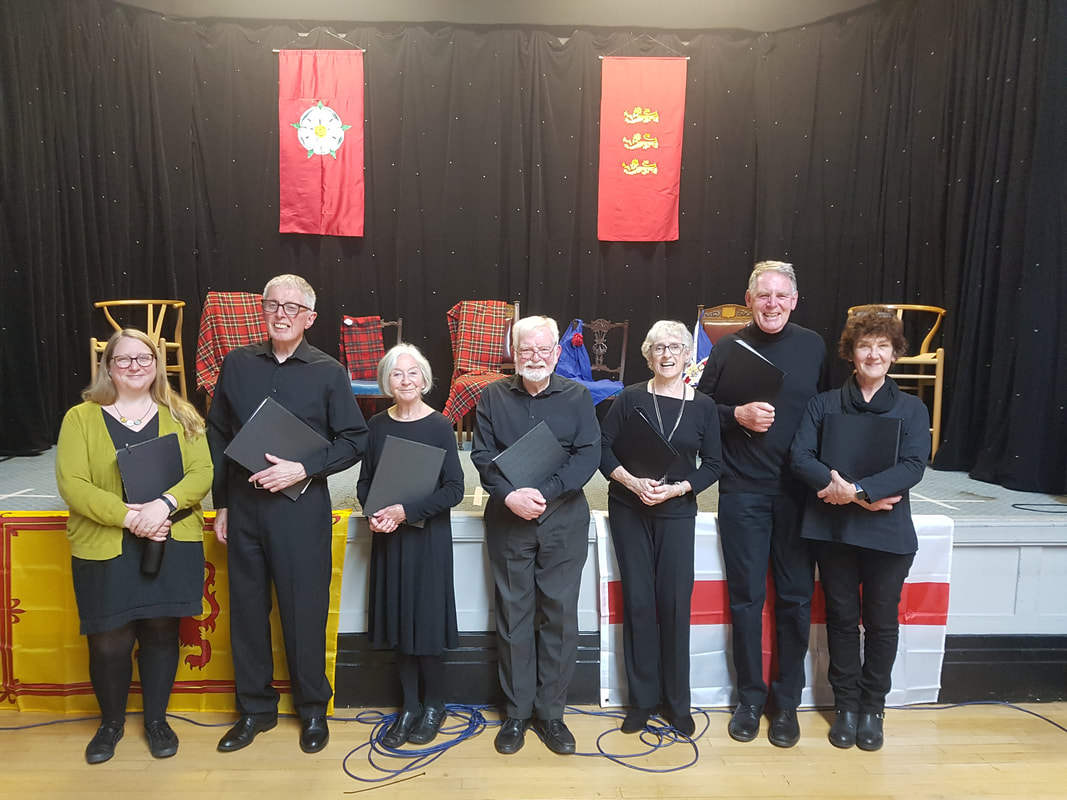Review by Seonaid Roberts of Heroic Strife Famed Afar performed at Strathearn Arts
Heroic Strife Famed Afar is the latest Crieff Drama Group production devised by John Cummings. The performance took place at Strathearn Artspace on Thursday 7 September in front of a full house and was the opening event in this year's Festival of Reading organised by the Library of Innerpeffray.
Heroic Strife consisted of readings of first hand accounts from the 1745 Jacobite Uprising, the Battle of Culloden and its aftermath. The accounts were read by five members of Crieff Drama and narrated by Jane Drysdale. John Cummings developed the readings from the Scots Magazines which are housed at Innerpeffrey Library alongside other material including the original letters and quotations of Anthony Murray who was born at Dollerie House, Crieff. These were used courtesy of Jamie Murray and Sue Hills and are taken from the late Tony Murray of Dollerie House's collection of his ancestor's letters entitled "A Young Man's Path to Culloden".
A feature of the evening was the singing of Gaelic and Scots songs of the period by traditional singer, Naomi Harvey. The interspersing of these songs and the readings was inspirational, giving time for the audience to reflect. Ms Harvey sang unaccompanied and held the audience enthralled with her beautiful voice and lyrics (kindly printed in the programme for non Gaelic speakers).
The story of the Jacobite Rebellion is well known to us all but this was a factual account based on voices and sources of the period.
The staging of the production was stark with the five readers sitting in a row. Once introduced by the narrator, the actor stood, spot-lighted, and delivered their quote in a variety of accents: the switching between Scottish, northern English and French accents was impressive. The clever stage positioning demonstrated the allegiance of the source of each quote.
The accounts included quotes from the London Magazine of the time "in the Highlands ignorance and superstition greatly prevail" and "the dress of the Highlander ... Is a short petticoat that reaches halfway down the thigh, the rest is brought over the shoulders and fastened below the neck. For the most part they wear the petticoat so very short that in a windy day, going up a hill or stooping, the indecency of it is plainly discovered" brought a chuckle from Ann Morrison's delivery of the quote.
The initial readings reported no great alarm at the arrival of the Young Pretender on Eriskay with "only 7 men, a very small stock of money and arms and no generals or officers fit for commanding". However, just over a month later the Prince and his supporters marched on Edinburgh which was taken without bloodshed or opposition causing alarm in the General Assembly of the Church of Scotland about a "Popish pretender to the throne". The success in Edinburgh resolved the Prince to push on to Carlisle which quickly capitulated. Finally the English Throne was forced to act and the Duke of Cumberland was given command of the Army. The Rebellion was stopped at Derby and a now dilapidated "band of outlandish vagrants" was chased back to Edinburgh where the citizens expressed joy for the coming of their delivererer, Cumberland.
After the defeat at the Battle of Falkirk, the Jacobites were pursued by the Duke of Cumberland north via Crieff. The Prince moved further north and captured Inverness where he partied whilst his men were in "a miserable condition without pay or food".
The Prince chose to fight at Drumossie Moor which "was the worst that could be chosen for the Highlanders and worse still the most advantageous for the enemy". His orders were to "give no quarter to Cumberland's troops on any account whatsoever". The plan was to attack Cumberland's men before daybreak but the element of surprise was lost amidst confusion and disorder. The Highlanders were "prodigiously tired with hunger and fatigue" and were powerless against the well equipped, well trained professional solders of Cumberland's Army.
The second half of the production covered the Battle and the inevitable slaughter which ensued with the Jacobites being pursued relentlessly to their deaths.
The songs "A Lament for William Chisholm" and "Another Song on the Day of Culloden" were highlights of this half.
Prince Charles returned to France: "my lads be in good spirits. It shall not be long before I shall be with you and shall endeavour to make up for all the loss you have suffered".
His campaign had lasted only 14 months but Scotland was changed forever: "The Deed is done: it is over".
Whilst London rejoiced at victory, the Highlands were ravished with "husbands and fathers murdered", "women subjected to brutal violation and turned out naked with their children tostarve on the barren heaths". "They have created a desert and called it peace".
This cast has worked together for many years and this was evident in a very slick and smooth production. Bravo to the cast: John Cummings, Helen Day, Jane Drysdale, Tom Inglis, Ann Morrison and Mike Owens.
We left the Artspace feeling a great sadness at the futility of the Campaign but applauding another success for Crieff Drama Club.

